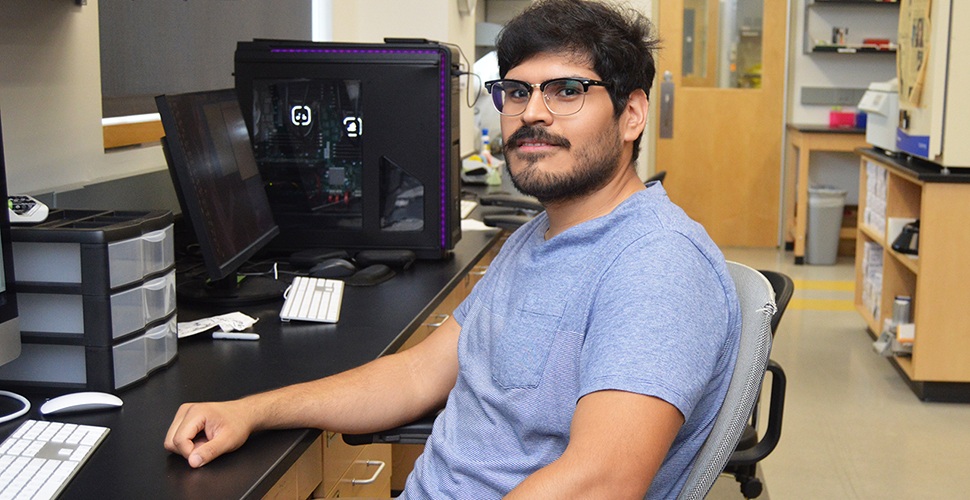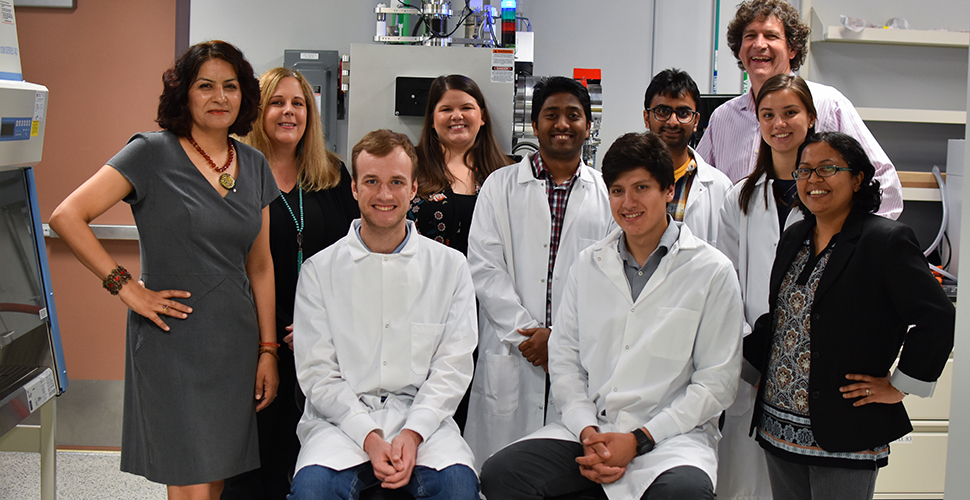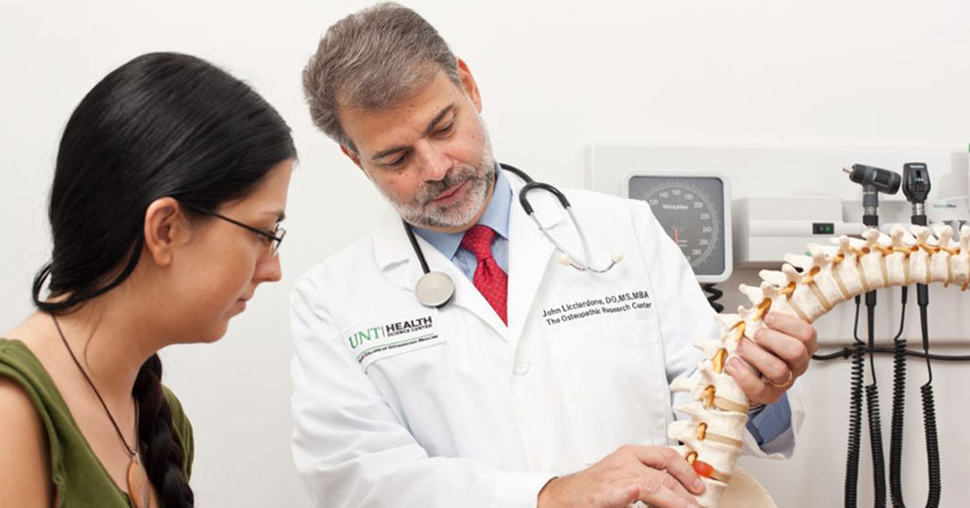![]() Every week, we do a little research of our own. We’re looking for scientists, professors, engineers, entrepreneurs—anybody, really—engaging in research and development across North Texas.
Every week, we do a little research of our own. We’re looking for scientists, professors, engineers, entrepreneurs—anybody, really—engaging in research and development across North Texas.
There’s plenty of good work being done. If you want to put R&D under your microscope, sign up for our e-newsletter.
How a gecko may hold the key to evolutionary question
The answer to the “queen of problems in evolutionary biology” may be held inside of a tiny gecko.
A graduate student at The University of Texas at Arlington hopes his research in evolutionary biology will unlock that answer, aided by a prestigious National Science Foundation grant.
Jose Maldonado, a second-year doctoral student in biology, was selected for a 2019 NSF Graduate Research Fellowship. It’s a program that helps outstanding graduate students pursuing research-based graduate degrees at accredited U.S. institutions in NSF-supported science, technology, engineering, and mathematics disciplines.
What’s the “Queen” of evolutionary biology problems? It’s this: How did sexually reproducing organisms evolve from asexually reproducing ancestors?

Jose Maldonado of the University of Texas at Arlington [Photo: Courtesy UTA]
The GRF award will support Maldonado’s dissertation research concerning why sexual rather than asexual reproduction evolved as the dominant form.
While asexual populations grow at a faster rate, giving them a demographic advantage, those populations can accumulate harmful mutations. Such mutations are normally removed from populations with sexual reproduction.
“As these mutations accumulate, they reduce the organism’s fitness and eventually lead to the extinction of asexual lineages,” Maldonado said in a statement.
Maldonado will use an asexual gecko species Lepidodactylus lugubris, also called the mourning gecko, to test his theories.
“We are planning to resequence the whole genome of both asexual and sexual geckos from natural populations, then test which geckos have accumulated more mutations,” Maldonado said. Find out more here.

UNT’s Office of Naval Research Grant Team is, front row – L to R: Anupama Kaul, Roman Madoerin, Jose Martinez, Ifana Mahbub. Second Row – L to R: Lisa Thompson, Kathryn Beasley, Dipon Biswas, Ravindra Mehta, Alexandra Tech. Third Row – Angus McColl.
UNT College of Engineering gets $750K from Office of Naval Research
Educational and research initiatives in materials, manufacturing, and electronics at the University of North Texas College of Engineering are getting a boost over the next three years from a $750,000 award by the Office of Naval Research.
The initiative will feature the benefits of miniaturized systems like sensors and actuators, which are the central parts of micro-electro-mechanical systems and nanotechnology, particularly for radio frequency applications, according to a statement.
Additive manufacturing and microfabrication technology are expected to create flexible, light-weight sensors with nanomaterials. Some of these structures will also be utilized to transmit and receive radio frequency signals.
Anupama Kaul, the PACCAR endowed professor of engineering, is the principal investigator of the grant and works in the Department of Materials Science and Engineering and Department of Electrical Engineering.
“Under this grant, we will collaborate with our partners at NAVAIR, the Naval Research Labs and other Naval facilities, along with other faculty affiliated with UNT’s PACCAR Technology Institute,” Kaul said in a statement. “Together, we intend to provide an integrated education, training and research experience for undergraduate and graduate students including outreach initiatives to North Texas middle and high school students in STEM.”
Students involved in this program will be able to learn more about Naval STEM careers and develop interdisciplinary skills to help fill a national need for highly trained Navy engineers and scientists.

Monika Schmitt and John Licciardone say in a study that empathy and understanding help produce higher outcomes for chronic pain patients. [Photo: University of North Texas Health Science Center College of Osteopathic Medicine]
New study highlights roles of empathy, understanding in treating chronic pain
New research at the University of North Texas Health Science Center’s College of Osteopathic Medicine shows that osteopathic medicine’s focus on physician empathy and understanding results in higher patient satisfaction.
Conducted by the PRECISION Pain Research Registry and TCOM’s John Licciardone, the two-and-a-half year study bolstered the importance of empathy and better interpersonal manners when treating patients with chronic pain, according to a statement.
“The greater levels of physician empathy and the better interpersonal manner reported by patients who were treated by osteopathic physicians may be important mediators of clinical outcomes in people with chronic pain,” Licciardone said in the statement. “That patients of osteopathic physicians reported lower levels of pain catastrophizing and were more resilient and better able to cope with their pain may explain their lower levels of disability.”
Monika Schmitt, a third-year TCOM student and PRECISION Clinical Research Fellow, helped write an article on the study that was published in The Journal of the American Osteopathic Association.
The study focuses on interpersonal manners, empathy, and communication style, and its results showed patients seeing osteopathic physicians had more favorable perceptions of their treatment, according to a statement.
Due to some foundational osteopathic beliefs including that the body is capable of self-regulation and self-healing, the study showed that osteopaths are less likely to prescribe opioids.
“Our results show that osteopathic physicians are less likely to prescribe opioids or nonsteroidal anti-inflammatory drugs for their patients with pain,” Licciardone said. “Thus, osteopathic philosophy and medical care is very consistent with current guidelines from the Centers for Disease Control and Prevention, which emphasize the importance of initiating chronic pain management with non-pharmacological treatments and avoiding opioids unless the benefits outweigh the risk for a patient.”
READ NEXT
![]()
Get on the list.
Dallas Innovates, every day.
Sign up to keep your eye on what’s new and next in Dallas-Fort Worth, every day.






























